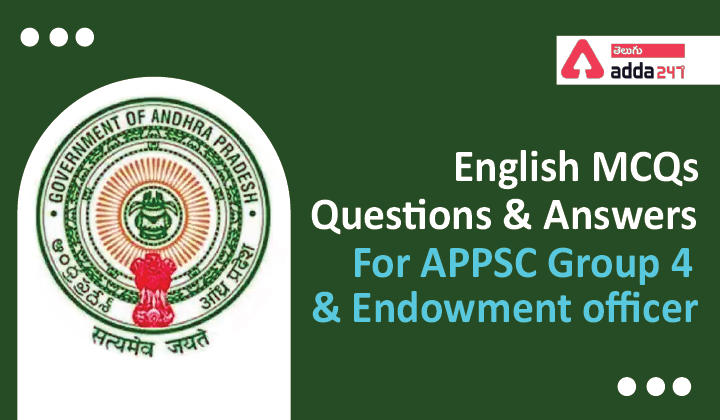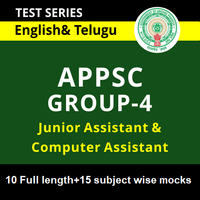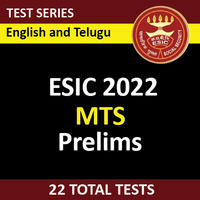English MCQs Questions And Answers: English is one of the most important scoring subjects for all AP State level exams like APPSC Group 1,2,3, and 4 APPSC Endowment Officers etc. In this article we are providing English MCQs Questions and answers, these MCQs questions and answers will definitely helps in your success.
English MCQs Questions And Answers: ఆంధ్రప్రదేశ్ మరియు తెలంగాణ లో అత్యంత ముఖ్యమైన మరియు ప్రతిష్టాత్మకమైన పరీక్షలు గ్రూప్-1,2,3 అలాగే UPSC లలోనికి చాలా మంది ఆశావహులు ఈ ప్రతిష్టాత్మక ఉద్యోగాల్లో కి ప్రవేశించడానికి ఆసక్తి చూపుతారు.దీనికి పోటీ ఎక్కువగా ఉండడం కారణంగా, అధిక వెయిటేజీ సంబంధిత సబ్జెక్టులను ఎంచుకుని స్మార్ట్ అధ్యయనంతో ఉద్యోగం పొందవచ్చు. ఈ పరీక్షలలో ముఖ్యమైన అంశాలు అయిన పౌర శాస్త్రం , చరిత్ర , భూగోళశాస్త్రం, ఆర్ధిక శాస్త్రం, సైన్సు మరియు విజ్ఞానం, సమకాలీన అంశాలు చాల ముఖ్యమైన పాత్ర పోషిస్తాయి. కాబట్టి Adda247, ఈ అంశాలకి సంబంధించిన కొన్ని ముఖ్యమైన ప్రశ్నలను మీకు అందిస్తుంది. ఈ పరీక్షలపై ఆసక్తి ఉన్న అభ్యర్థులు దిగువ ఉన్న ప్రశ్నలను పరిశీలించండి.
 APPSC/TSPSC Sure shot Selection Group
APPSC/TSPSC Sure shot Selection Group
English-Questions
Directions (1-5): Which of the following phrases (I), (II), and (III) given below each sentence should replace the phrase printed in bold letters to make the sentence grammatically correct? Choose the best option among the five given alternatives that reflect the correct use of phrase in the context of the grammatically correct sentence. If the sentence is correct as it is, mark (e) i.e., “No correction required” as the answer.
Q1. The Reserve Bank expects India’s economic growth rate may rise by to 7.4 per cent in the current fiscal, from 6.6 per cent in 2017-18, on account of revival in investment activity.
(I)expects India’s economic growth rate to strengthen
(II)is expecting an increment in India’s economic growth rate
(III)is expecting India’s economic growth rate to escalate
(a)Only (I)
(b)Only (II)
(c)Both (I) and (III)
(d)All (I), (II) and (III)
(e)No correction required
Q2. The Economic Survey tabled in Parliament on January 29, have been estimating that India will be re-establishing itself as the world’s fastest growing major economy with GDP expanding by 7-7.5 per cent in 2018-19.
(I)had estimated that India would re-establish
(II)have estimated that India might establish
(III)has estimated that India may be establishing
(a)Only (I)
(b)Only (II)
(c)Both (I) and (II)
(d)Both (II) and (III)
(e)No correction required
Q3. India can surely become the world’s skill capital but not with what they are trying to do now.
(I)it has been doing for last one year
(II)it is doing right now
(III)they have done in recent past
(a)Only (I)
(b)Only (III)
(c)Both (I) and (II)
(d)Both (II) and (III)
(e)No correction required
Q4. The India-Japan economic relationship remains underwhelming both in relation to its potential, and to the ties that each nation shares with China.
(I)being share with
(II)each have been sharing with
(III)that the two nations are sharing
(a)Only (I)
(b)Only (II)
(c)Only (III)
(d)Both (I) and (II)
(e)No correction required
Q5. The latest and most trending change of the ever-evolving world in fashion is the introduction of pastels – subtle yet elegant, minimal yet stylish.
(I)to this ever-changing world with fashion
(II)in the ever-evolving world of fashion
(III)in the world of fashion to evolve
(a)Only (I)
(b)Only (II)
(c)Both (II) and (III)
(d)Both (I) and (III)
(e)No correction required
Directions (6-10): There are two different sentences with a blank space in each question. Choose the word from the given options which fits into both the blanks appropriately adding a proper and logical meaning to the sentences.
Q6. She had authorised British forces to conduct precision air-launched cruise missile ____________ on Syria to degrade its chemical weapons capability, saying there was no ______________ to military action.
(a) pound; substitute
(b) strikes; alternative
(c) beat; restrain
(d) hits; refrain
(e) attacks; walkout
Q7. The _______________ carved head of a Buddha protrudes from the ground – it probably fell from its post during an earthquake, our guide ______________.
(a) intricately; speculates
(b) intricate; refers
(c) beautifully; assume
(d) delicately; guess
(e) specially; thinks
Q8. Farmers usually ______________ await good rains, but not the unseasonal ones like those that ______________ Chittoor district last November.
(a) sensitively; sighed
(b) doubtfully; benefited
(c) keenly; relieved
(d) eagerly; lashed
(e) regularly; charmed
Q9. Any macro-economist _____________ say that if 87.5% of the currency is being demonetised, then it better _______________ made sure that a similar amount of currency is printed and ready to be put back in circulation.
(a) should; needs to
(b) forcefully; must
(c) would; be
(d) repeatedly; to
(e) will; so
Q10. The company will _______________ on artificial intelligence and automation to win digital deals, reskill employees and __________________ more locals in markets such as US, Europe, and Australia.
(a) stuck; recruit
(b) depend; purchase
(c) pivot; fire
(d) count; charter
(e) rely; hire
Directions (11- 12): Choose the word which is most similar in meaning of the word printed in bold in the context of the passage.
Q11. Sordid
(a) expedite
(b) abet
(c) parlay
(d) corrupted
(e) sustain
Q12. Vilified
(a) escalation
(b) accretion
(c) divulge
(d) disparage
(e) acclaim
Directions (13- 15): Choose the word which is most opposite in meaning to the word printed in bold in context of the passage.
Q13. Forbid
(a) asperse
(b) sanction
(c) fascinate
(d) admit
(e) feeble
Q14. Hyped
(a) annihilate
(b) secrecy
(c) satiate
(d) devour
(e) indulge
Q15. Hoover
(a) abject
(b) pitiable
(c) covet
(d) despicable
(e) abstain
English-Solutions
S1. Ans. (c)
Sol. Read the expression given in the sentence carefully; the expression ends with “may rise by”. Thus, the use of the preposition “by” at the end makes it grammatically incorrect as the two prepositions cannot be used simultaneously [“by” and “to”]. Among the given alternatives, the (I) and (III) expressions can be used as a replacement to the highlighted expression. It is to be noted that the two expressions give the similar meaning to the sentence without altering its contextual and grammatical structure. Hence option (c) is the correct choice.
S2. Ans. (a)
Sol. Read the complete sentence carefully; the subject i.e., “The Economic Survey” is in singular and thus the use of the plural verb “have” is incorrect. Moreover, it is to be noted that the sentence mentions specifically that the survey was tabled on January 29 and thus the use of the present form of verb will make the sentence grammatically incorrect. Among the given alternatives, only the first expression provides the exact replacement to the highlighted expression. It does follow the correct structure to make the sentence grammatically and contextually correct. Hence option (a) is the correct choice.
S3. Ans. (c)
Sol. Read the sentence carefully; the subject is singular [India] and thus we cannot use the plural determiner for the same [they]. Among the given options, both the first and the second expressions can replace the highlighted phrase to form a meaningful sentence respectively. The sentences so formed will be both grammatically correct and contextually meaningful. Hence option (c) is the correct choice.
S4. Ans. (e)
Sol. The highlighted expression used in the sentence is grammatically correct and at the same time gives a meaningful sense to the sentence. Hence option (e) is the correct choice.
Also Read: APPSC Group-IV Junior Assistant Study Plan
S5. Ans. (b)
Sol. There is a prepositional error in the highlighted expression. The most correct expression that can replace the existing one is option (b) i.e., “in the ever-evolving world of fashion”. This makes the sentence both grammatically and contextually correct. Hence option (b) is the correct choice.
S6. Ans. (b)
Sol. (b) is the correct answer as it conveys the meaning of the statement correctly.
(a) is incorrect as ‘poundings’ need to be used instead of ‘pound’ to make it correct.
(e) cannot be correct. ‘walkout’ needs to be followed by ‘from’ to make it correct but in the statement the 2nd blank is followed by ‘to’.
S7. Ans. (a)
Sol. (a) is the correct answer as it predicts the meaning accurately.
(b) cannot be the answer as ‘intricate’ cannot be used here as the statements talk about how precisely the head of Buddha is carved so ‘intricately’ is the correct word for the 1st blank.
(c) cannot be correct as ‘assume’ is used for plural but the guide is singular therefore ‘assume’ needs to be replaced with ‘assumes’.
(d) cannot be correct as ‘guess’ is used for plural but the guide is singular therefore ‘guess’ needs to be replaced with ‘guesses’.
specially gives incoherent meaning to the sentence therefore (e) cannot be correct.
Also Read: తెలంగాణా జానపద నృత్యాలు
S8. Ans. (d)
Sol. (d) is the correct answer as it conveys the meaning of the sentence that farmers eagerly await good rains but not the unseasonal rains because they are harmful to the crops.
(a) cannot be correct as ‘sighed’ contradicts the 2nd part of the statement. The 2nd part tells that farmers do not want unseasonal rains therefore the rains must be having some harmful effects to their crops but ‘sighed’ means ‘relief’ hence (a) cannot be the answer.
(b) cannot be the answer because both the words are just opposite to the meaning of the sentence.
The 1st part of the sentence needs a positive word and 2nd part needs negative word to explain the correct meaning of the sentence.
(c) cannot be the answer as ‘relieved’ contradicts the 2nd part of the statement. The 2nd part tells that farmers do not want unseasonal rains therefore the rains must be having some harmful effects to their crops but ‘relieved’ means ‘relief’ hence (c) cannot be the answer.
(e) cannot be the answer as ‘regularly’ is not required here, it gives vague meaning to the sentence besides ‘charmed’ is also incorrect as 2nd part needs negative word to explain the correct meaning of the sentence while ‘charmed’ means ‘delight greatly’.
S9. Ans. (c)
Sol. (c) is the correct answer and it completes the sentence.
(a) cannot be correct as in ‘needs to’, ‘to’ is being used as an infinitive verb and an infinitive verb is followed by 1st form of verb therefore ‘made’ after ‘to’ is incorrect; ‘made’ should be replaced with ‘make’.
(b) is incorrect as it gives vague meaning to the sentence and use of ‘must’ just after ‘better’ is wrong.
(d) cannot be the answer because if we put ‘repeatedly’ in the 1st blank then ‘say’ is wrong. It needs to be replaced with ‘says’ but with ‘would’ ‘say’ is correct.
(e) cannot be the answer as ‘so’ is incorrect in 2nd blank.
Static GK- List of UNESCO World Heritage Sites in India
S10. Ans. (e)
Sol. (e) is the correct answer as it conveys the meaning of the statement correctly.
(a) cannot be correct as ‘stuck’ means ‘something resembling or likened to a stick, in particular’.
(b) cannot be correct as ‘purchase’ doesn’t fit in the sentence. Men cannot be purchased and it doesn’t specify about anything which needs to be purchased.
(c) ‘fire’ is not correct here as the company wants to expand its business by winning more deals. An expanding company hires people rather than ‘fire’ them.
(d) use of ‘charter’ is incoherent to the sentence therefore it cannot be the answer.
S11. Ans. (d)
Sol. Sordid means involving immoral or dishonourable actions and motives; arousing moral distaste and contempt. Hence it has the same meaning as corrupted.
Expedite means make (an action or process) happen sooner or be accomplished more quickly.
Abet means encourage or assist.
S12. Ans. (d)
Sol. Vilified means speak or write about in an abusively disparaging manner. Hence it has the same meaning as disparage.
Accretion means growth or increase by the gradual accumulation of additional layers or matter.
Acclaim means praise enthusiastically and publicly.
Divulge means make known.
S13. Ans. (b)
Sol. Forbid means refuse to allow. Hence it has the opposite meaning to sanction.
Feeble means lacking physical strength.
Fascinate means attract the strong attention and interest of (someone).
Asperse means attack or criticize the reputation, or integrity of.
Also Check:RRB NTPC Cut Off 2021
S14. Ans. (b)
Sol. Hyped means promote or publicize (a product or idea) intensively, often exaggerating its benefits. Hence it has the opposite meaning to secrecy.
Annihilate means destroy utterly; obliterate.
Devour means read quickly and eagerly.
Satiate means satisfied to the full; sated.
S15. Ans. (e)
Sol. Hoover means consume something quickly and eagerly. Hence it has the opposite meaning to abstain.
Covet means yearn to possess.
Pitiable means deserving or arousing pity.
Abject means completely without pride or dignity; self-abasing.
Despicable means deserving hatred and contempt.
Also read: 17th January 2022 MCQS Questions And Answers
AP State GK MCQs Questions And Answers in Telugu:
General awareness Practice Questions and Answers in Telugu
English MCQs Questions And Answers
Current Affairs Practice Questions and Answers in Telugu








